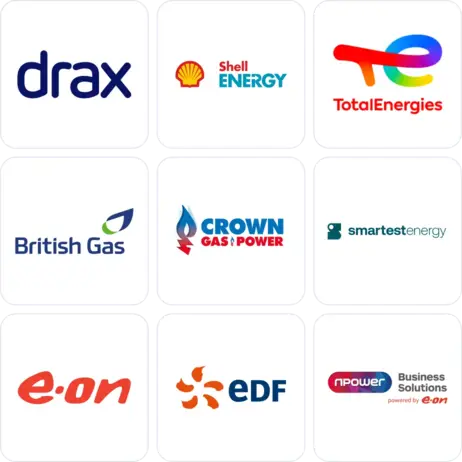Ready To Start?
Get the latest quotes with support and advice from our team of mid-market energy specialists
Get a Bespoke QuoteWe help large businesses secure competitive energy contracts, reduce risk, and control long-term costs.


Tell Us About Your Business
Answer a few questions and let us find the best deals.

Get Personalised Quotes
See exclusive pricing from top UK suppliers.

Secure Your Contract
Choose the best deal for your business, and we'll handle the rest.
Energy Procurement is the process of finding the best energy contracts and solutions for your business. Energy-intensive businesses use this process to secure better deals on their business energy and to track and manage their energy goals. These goals could include optimising energy spending, achieving net-zero, or implementing more renewable solutions.
We help you source the best commercial gas and commercial electricity prices, to meet sustainability targets, build efficiency plans and monitor market volatility.
"Navigating the energy market requires specialised knowledge and experience. Our team of energy procurement experts have a deep understanding of market dynamics, supplier relationships, and regulatory requirements. We are your trusted advisors, guiding you through the process and ensuring you get our best possible deal." - Clair Scott (CFO and COO)
We have a great ongoing relationship with many top UK energy suppliers, so we ensure our customers get a personalised energy solution that helps them achieve their business goals. Compare your business with the following to see what you can expect:
Property Management Business
£28,450
Based on a 24-month fixed-term contract that started on 01/2024, the figure above is a combined estimated annual savings by purchasing through us vs. their current supplier's out-of-contract variable price at the current contract end date. This is a unit rate and standing charge comparison only. Pricing is subject to international affairs and energy market trends.
Hospitality Business
£10,781
Based on a 12-month fixed-term contract that started on 06/2024, the figure above is a combined estimated annual savings by purchasing through us vs. their current supplier's out-of-contract variable price at the current contract end date. This is a unit rate and standing charge comparison only. Pricing is subject to international affairs and energy market trends.
Farming & Agriculture Business
£35,572
Based on a 36-month fixed-term contract that started on 01/2024, the figure above is a combined estimated annual savings by purchasing through us vs. their current supplier's out-of-contract variable price at the current contract end date. This is a unit rate and standing charge comparison only. Pricing is subject to international affairs and energy market trends.
We support businesses in switching to renewable energy, helping them meet sustainability goals without compromising performance or cost.
Our green energy procurement includes:
Whether you're aiming to enhance your ESG profile or reduce emissions, we help you procure greener energy with confidence.
Take control of your energy costs with fixed price agreements that remove uncertainty and allow for better long-term planning.
Benefits of our fixed price procurement:
Ideal for businesses looking to stabilise budgets and avoid unexpected energy cost increases.
Beyond procurement, we help businesses reduce unnecessary charges by reviewing energy billing practices, ensuring they only pay for what they use.
Our cost optimisation services include:
This service is ideal for businesses looking to reduce overheads, especially those operating across multiple sites or with varying energy demands.
We offer fully compliant procurement solutions for public sector bodies and regulated buyers, ensuring transparency and audit-readiness.
Our frameworks deliver:
Let us manage the complexity so you can stay focused on service delivery.
The main objective of commercial energy procurement is to secure great energy rates with an energy supplier that can manage a large consumption user. This may involve understanding and implementing data management systems to understand how the company uses gas and electricity to identify savings and efficiencies.
Whilst price is an important factor, other important considerations come into the decision-making process. For example, new supplier contracts must meet any sustainability targets, meet regulations and offer a data package that allows the company to make progress on their journey to becoming more sustainable.
You may need to identify what type of energy meter you have to get the most accurate quote. For example, most large consumption users will have a half-hourly meter for their electricity.


Any business that uses energy will need a procurement strategy. There are lots of benefits to implementing an energy procurement process.
Tendering is a process where organisations invite bids from suppliers to provide goods or services for large projects.
At Love Business, we submit your business case to our panel of suppliers so they can bid to win your contract. They will offer you their best and most competitive prices for you to choose from.

Depending on the industry the organisation is operating in, it may require specific processes that must be met when procuring products and services. This is no different for the energy supply.
The government outlines a framework for procurement that should be followed. Here’s how it is broken down:
Energy procurement for manufacturing, warehouses and various other energy-intensive industries should follow similar guidelines; with the addition of making a list of desirable features. This may include energy management software and other renewable goals.